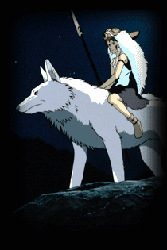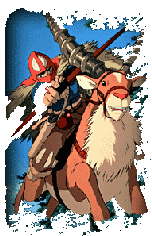PRINCESS MONONOKE
Featuring the voices of Billy Crudup, Claire Danes, Billy Bob Thornton, Minnie Driver, Jada Pinkett Smith, Gillian Anderson
 I finally got to see the English language version of this put out by Miramax/Disney. It was awesome to see Japan's most popular movie of all time on the big screen. A few months ago, I reviewed the Japanese version.
I finally got to see the English language version of this put out by Miramax/Disney. It was awesome to see Japan's most popular movie of all time on the big screen. A few months ago, I reviewed the Japanese version.
There are a few differences (mostly due to translations), but they pretty much kept the same feel and atmosphere. Under contract, they were unable to cut the film in anyway, so it still runs at 2 hours and 15 minutes. Plus they kept the same score (they changed the songs to English, but they're still sung in the same tune and style).
In this translation, Ashitaka (Crudup) is a prince of a village who is cursed after defeating a boar god on the rampage. By their laws, he is exiled from the village, but must travel far to find the boar's origins and perhaps find a cure for himself. He discovers the land where the boar came from, but it is one filled with turmoil. The people, led by Lady Eboshi (Driver) are destroying the forest to forge iron. Thus they are at war with the animals of the forest, especially the wolf tribe led by their wolf princess, San (Danes). At the same time, the Shoguns are making their move to take over the land, now that its resources have been found. The emporer has also sent a monk named Jizo (Thornton) to hunt down the Great Forest Spirit and take its head...which is said to give immortality. Ashitaka must now judge with unclouded eyes which side he must take. The story is so well developed.
 The creator, Miyazaki (Kiki's Delivery Service, My Neighbor Totoro), has often been called the Walt Disney of Japan. But it is only in the sense of his ability to sell his animated films that he earns this title (there are no singing and dance numbers and animals that talk do so for a good reason...here because they're gods). The content and stories of his movies reach a vast age group. The colorful characters appeal to the kids, while the storylines force the more mature audience to think.
The creator, Miyazaki (Kiki's Delivery Service, My Neighbor Totoro), has often been called the Walt Disney of Japan. But it is only in the sense of his ability to sell his animated films that he earns this title (there are no singing and dance numbers and animals that talk do so for a good reason...here because they're gods). The content and stories of his movies reach a vast age group. The colorful characters appeal to the kids, while the storylines force the more mature audience to think.
In Mononoke, he gives three levels to his story. The first is innocence. Ashitaka and San are both innocent youths thrown in a war among humans, beasts, and gods. In the process, they learn about corruption, deceit, love, and betrayal...feelings which were once foreign to them. The second level is that of technology vs. nature. There's a strong ecological message to this movie. Eboshi's attempts to drive out the beasts of the forests so she can mine her iron and create better guns reflect a debate that is becoming larger and larger in our world today. Finally, he makes a commentary about the state of religion in today's society. The theme of man vs. god is probably the most complex, but woven so skillfully into the story. He presents the question of how man can kill a god...where in today's society, it seems as if religion is being cast away because man thinks he can live without God.
The English language version loses a bit in the translation...the Japanese is a bit more poetic. Instead, the dialogue is more direct and to the point. The other thing is that Japanese animated characters have certain mannerisms and the voice actors have mannerisms in their speech as well...and these work well together. But this changes when Hollywood actors do the dialogue...those mannerisms are slightly lost. But this is a minor detail that barely takes away from the movie.
This critically acclaimed film has often been called "Star Wars set in feudal Japan." I like to think of it as a cross between Star Wars and Braveheart. When people think of fantasy movies, they think of dragons and wizards and knights. But Miyazaki shows us what fantasy movies can be outside of that realm. This is an animated epic that works so well on the big screen. It's too bad that it's only in limited release and that it wasn't promoted as it should have been. Locally, it's currently playing in Edwards Long Beach (in the Long Beach Towne Center), but I believe for only a week. If you have a chance, I encourage you to see it. It's so very different on the big screen.
-JoE-
©1999 JMR
// main | movie reviews
// © 2001 jgpalanca all rights reserved